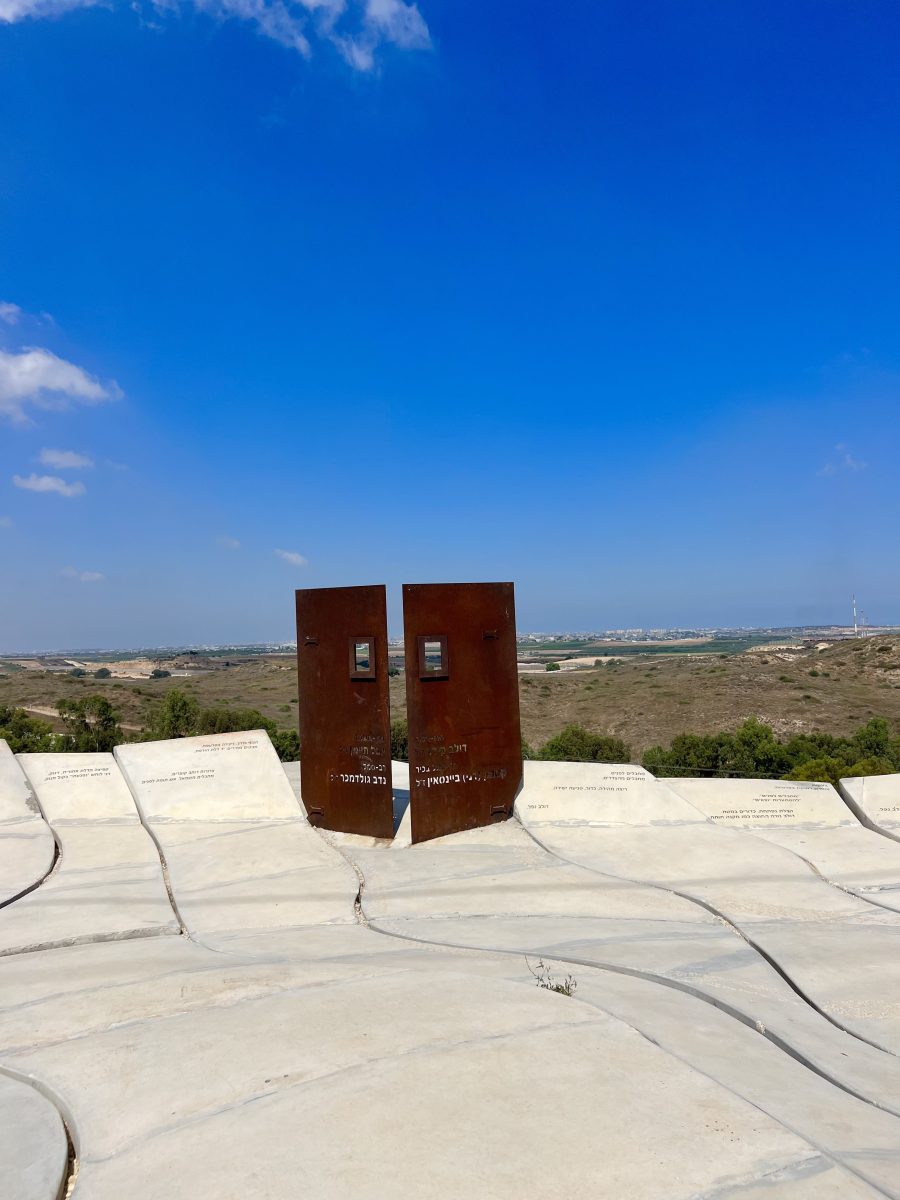On the morning of Oct. 7, news broke around the world that Hamas, the terrorist group that controls the Gaza Strip, had crossed the border into Israel and launched a surprise invasion. Members of Hamas attacked border towns and other areas in Israel on foot, going into homes and taking hostages. Hamas also launched an air attack of thousands of rockets, causing Israel to use their Iron Dome defense system. Hamas has killed hundreds of innocent people, documenting these murders on social media.
This war can be hard to understand, considering the amount of biased information on the internet. Read on to learn more about the current situation, and explore the linked resources at the end of this article for more information.
What is Hamas?
To understand this war, it is important to know what Hamas is, and what their goals are. Hamas is recognized as terrorist by the United States, the European Union, and other countries. However, some countries only classify Hamas’s military branch as terrorists.
In 2005, Israel withdrew from Gaza in the wake of the Second Intifada. The Second Intifada was a violent Palestinian uprising against the Israeli military that resulted in 4,000 people killed, including civilians. After Israel withdrew from Gaza, Hamas won a majority in the Palestinian legislature in 2006. This caused the US to end aid to Gaza, because Hamas would not recognize Israel, nor would it denounce violence. In 2007, Hamas won complete control of Gaza in a civil war after defeating the rival party Fatah, which rules in the West Bank.
In the following years, there were many conflicts around the Gaza-Israel border, most of which ended in the deaths of both Palestinians and Israelis. Hamas has a charter that has been published online, which outlines its goals in detail. The charter calls for the death of Jews (Article 7), the obliteration of Israel (Preamble), and the rejection of any peaceful negotiations (Article 13), all while using antisemitic tropes.
It is important to note that the goals of Hamas are not the goals of every Palestinian or Muslim person, and Hamas’s goals are extremist. While Hamas claims to support Muslims and represent the need for a Palestinian state, their war tactics have displayed the opposite. Hamas has used civilians as human shields for years, purposefully putting rocket launch sites and important bases next to or inside schools, hospitals, and mosques.
A group that claims to be proponents of the Muslim faith purposely put rocket launchers next to the holy building of Muslims. By using these locations, they are limiting their own vulnerabilities. If Israel defends itself, there is a higher risk of civilian casualties, due to the nature of these locations. If Israel doesn’t defend itself out of fear of high civilian casualties, Hamas can continue attacks without any consequence. It is estimated that Hamas is in possession of more than 10,000 rockets, according to NATO. “This infrastructure is concealed in private homes, tunnels, and public buildings such as mosques,” NATO Strategic Communications wrote.
By using these human shields, Hamas is purposely putting the lives of innocent Gazans on the line. These tactics allow Hamas to collect incidents where civilians died and use it to cast judgment on the morality of the Israeli Defense Forces (IDF), and accuse them of war crimes. It is important to note the IDF tries to purposely warn those in possibly dangerous sites to evacuate. Throughout this war, the IDF has used leaflets and text messages to civilians to warn them that they should evacuate. “Palestinians said they had received renewed warnings from Israel’s military to move from north Gaza to the south of the strip, with the added warning that they could be identified as sympathizers with a ‘terrorist organization’ if they stayed put,” according to Reuters.
Hamas has made it clear that they don’t care about the death of the people whom they are supposed to represent, with a spokesperson saying in 2014 that they “despise those defeatist Palestinians that criticize the high number of civilian casualties. The resistance praises our people…we lead our people to death…I mean, to war.”
Is Israel an apartheid state? Do they participate in ethnic cleansing?
After this war started, there was a conversation on the internet regarding Israel’s treatment of Arabs living in the state, and whether Israel is an apartheid state towards Arabs. Apartheid is defined by Merriam-Webster as “segregation that can manifest in political, social, and economic discrimination.” This term originates from the political system in place in South Africa from 1948 to 1994. At this time, South Africa had extreme laws that split up society between their white minority and Black majority. These laws banned interracial marriages, forced the removal of Black South Africans from their homes to rural areas, and voting rights were severely restricted.
Over the past few weeks, there have been accusations aimed at Israel stating they treat Israeli Arabs in an apartheid manner. However, Israeli Arabs have the same legal rights as Jewish Israelis, making up around 21% of the Israeli population. There are 362,000 Israeli Arabs who live in East Jerusalem who hold permanent resident status and do not have full-citizen status. This is because they have declined the Israeli government’s offer of citizenship, which began in 1967, and chose to not hold citizenship for a range of reasons, including not wanting to identify with the Israeli government. According to the Inter-Agency Task Force on Israeli Arab Issues, “Today, East Jerusalem residents can apply for Israeli citizenship through a process that is less time-consuming and challenging than it had been in prior years.”
One of the biggest differences between Israeli Arabs and Jewish citizens is that Arabs are not required to serve in the IDF, unlike their Jewish counterparts. According to the Council on Foreign Relations, this can cause social tension between Jews and Arabs, but Arabs are still free to serve in the army if they choose to. The discrimination that Israeli Arabs face, while unfair, does not fit the definition of apartheid. “Israel’s declaration of independence recognizes the equality of all the country’s residents, Arabs included,” according to the Council on Foreign Relations.
However, the most glaring difference between Arabs and Jewish citizens is the economic imbalances and unequal infrastructure in the majority of Arab towns. This issue has been present in Israel’s society for a long time, with the median income for Israeli Arab households being around $1,500 lower than the average income for a Jewish household, according to the Israeli Central Bureau of Statistics. In order to combat this problem, a “$9 billion, five-year plan to boost employment, improve health-care services and housing, and develop infrastructure” has been put in place by the Israeli government, according to the Council on Foreign Relations.
Another common criticism of the Israeli government has been that they are ‘ethnically cleansing’ the Israeli Arab population. The United Nations has defined ethnic cleansing as “policy designed by one ethnic or religious group to remove by violent and terror-inspiring means the civilian population of another ethnic or religious group from certain geographic areas.”
However, a study by the Central Bureau of Statistics concluded that there were 156,000 Arabs living in Israel in 1948 when Israel became a state. At the end of 2020, there were almost 2 million Arabs living in Israel, which is approximately a 1,182% increase. According to the definition, if Israel was trying to ethnically cleanse Arabs out of Israel, they would have massively failed. Israel is not an apartheid state by any legal standard, nor is it attempting to ethnically cleanse Arabs, as proven by years of data.
Another common belief is the idea that non-Jewish people may not become citizens of Israel, but this is untrue. It is more complicated to become a citizen as a non-Jew, but it is inaccurate to say that non-Jews can’t or don’t live in Israel.
What are the Israeli Defense Forces (IDF), and why are they criticized online?
The IDF is Israel’s military. They state on their website that their goal is to protect Israel’s independence while upholding human dignity and protecting democratic values. Just like any other state with a military, Israel is exercising its right to defend itself against attack.
Recently, the IDF has come under attack for the number of Gazan deaths and the humanitarian crisis unfolding in the Gaza Strip. After Hamas terrorists broke into Israel, killing thousands and taking hundreds of hostages, Israel declared a siege on Gaza. This meant that Israel stopped all electricity, food, fuel, and water aid that they were previously giving to Gaza. The Israeli minister of defense said this would stay in place till Hamas released their hostages.
This siege has plunged Gaza into inhumane conditions, with electricity, water, and resources running dangerously low. In theory, if Hamas were to release the hostages they are holding, Israel would return the aid that they have given in the past. However, as the humanitarian crisis continued, international countries called on Israel to allow aid into Gaza. After this, Israel announced that they would allow aid to come in through the Egyptian border. While this aid is far from what is needed, if it continues it will ease conditions.
Israel has also been criticized for turning Gaza into an ‘open-air prison.’ This term refers to the effects of the blockade that has been in place over Gaza for 16 years. After Hamas took power in Gaza, Israel imposed an air, sea, and land blockade on Gaza, with the support of Egypt. This blockade has heavily restricted food and water, the movement of Gazans into Israel, and has in general created high levels of poverty.
According to CNN, Israel has given water and work permits, among other forms of aid to Gaza in the past. The blockade refers to Israel making it harder for items to get into Gaza due to the terrorist presence, not them cutting off all aid.
This blockade was put in place to prevent Hamas from shipping weapons that they would use against Israel. Due to the violent nature of the Hamas charter, this blockade was supposed to help protect Israel from Hamas. However, this blockade has caused Hamas to build an extensive tunnel network they use to smuggle in weapons.
A recent story broke that a hospital in Gaza had been hit by a bomb, killing many innocent Palestinians. A hospital, filled with hundreds of sick and injured Gazans, was blown up, adding hundreds to the already high number of casualties of this war. Once this news broke, Hamas blamed Israel for this attack, saying they had intentionally fired a rocket at this hospital. Many major news companies, including the New York Times, immediately ran this story.
As this news spread, people viciously attacked the IDF and the Israeli government, accusing them of committing war crimes, and even genocide. However, as the days have passed, multiple experts have watched footage of the explosion and come to a consensus that the hospital exploded because of a Hamas misfire. An analysis done by CNN concluded that the rocket likely broke up in the air and exploded over the hospital causing the explosion. “All [experts] agreed that the available evidence of the damage at the site was not consistent with an Israeli airstrike,” CNN wrote.
After the real cause of the hospital explosion began to spread, the New York Times published an editor’s letter apologizing for their coverage, and other news sources had to change their stories.
Final Notes
There has been a massive amount of information on this war in the news and social media, much of which is inaccurate. When learning about this war, make sure to get information from credible news publications and read beyond headlines. It is important to emphasize that Israel is not at war with Palestinian people, or Muslim people, they are fighting Hamas.
As of the time of writing, Hamas is still holding over 200 hostages in Gaza. Hamas doesn’t want peace in the Middle East, a two-state solution, or the violence to end, as they state in their charter. This war has increased hate around the world, with both antisemitic incidents skyrocketing and acts of hate toward Muslims spreading.
When events like this happen, it is important to remain respectful and keep yourself educated. Reach out to friends and family and check in during this time. Attached below are links to credible resources if you want to educate yourself further.
Resources for readers:
NATO Strategic Communications document on Hamas
Reuters information hub on Israel-Hamas conflict and history
AP News live updates on the war
CNN analysis on hospital blast
Looking at aid given to Gaza by Israel & other countries








